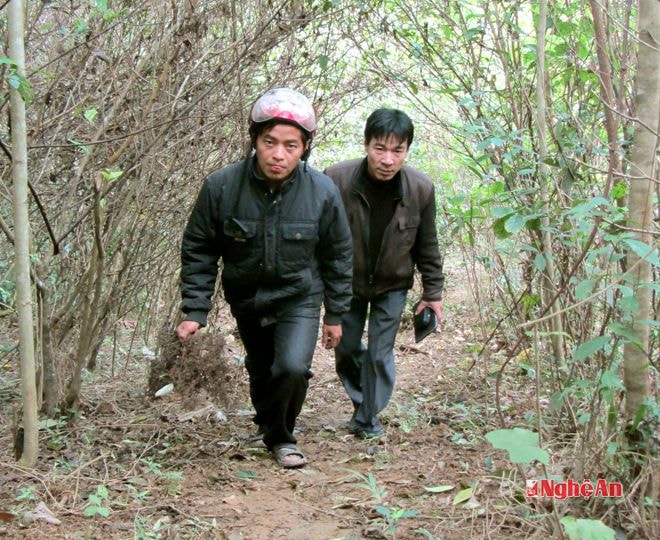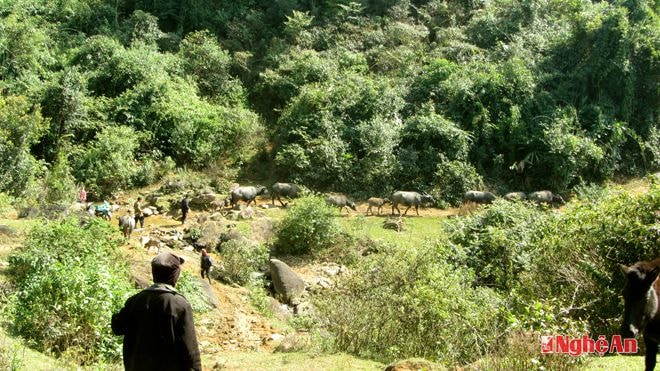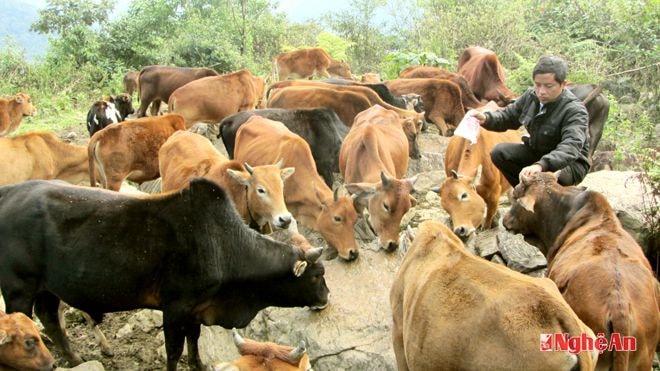The desire to get rich on the top of Pha Danh
(Baonghean) - Tho Ba Vu in Pa Khom village, Tri Le commune (Que Phong) is a rare young person in the highlands to be awarded a Certificate of Merit by the Provincial People's Committee for "Farmers competing in good production, uniting to help each other eliminate hunger, reduce poverty and enrich themselves legitimately". On the windy top of Pha Danh, watching Tho Ba Vu - a 26-year-old Mong man puffing out his chest and calling his herd of cows, I kept imagining Ho Giao - a Labor Hero on Ba Vi mountain, Ha Tay province in the late 60s of the last century...
Barefoot billionaire
Being introduced, I went to the foot of Pha Danh mountain to meet Tho Ba Vu. The guide was Vi Van Hoi - Chairman of the Farmers' Association of Tri Le commune, pointing to a young man in black lying half-asleep on the leaves, saying: "That's Tho Ba Vu!". Oh! The Mong billionaire, who owns hundreds of buffaloes, cows, and horses as Mr. Nguyen Huu Nhi - Chairman of the Farmers' Association of the province praised, is this guy! The climate in the border area of Tri Le is not like the lowlands. The sun is golden but the wind is cold as a knife. Each gust of wind blows like a thousand needles piercing the skin and flesh, yet Vu was barefoot in plastic sandals, wearing simple clothes. Crawling up, listening to Vi Van Hoi's solemn introduction, Tho Ba Vu grabbed my hand and shook it, his simple face smiling: Are you okay? Is it cold up here!... I asked: Why are you so cold? Vu replied: We're getting ready to go up the mountain. Let's go up the hot slope right away!...
 |
| Young owner Tho Ba Vu (in front) led reporters to visit his livestock farm. |
Tho Ba Vu has 4 farms raising buffalo and cows. The nearest farm is halfway up Pha Danh mountain. The distance is close, but the steep slope makes it seem far. When we reached the grazing ground, I was exhausted! Vu said: You guys sit down and rest, I will go to the edge of the forest to call the cows. There were nearly 50 cows and 4 horses eating grass. Vu stretched his chest, clasped his hands together like a "loudspeaker" to call the cows. A few dozen minutes later, a herd of about 40 cows of all colors: red, yellow, black, brown... flocked from the forest to the grazing ground. "Partly they are familiar with their owner's voice. Partly they miss the salt" - Vi Van Hoi explained. It was true that the herd of cows were craving salt. When Vu took small handfuls of salt and sprinkled them evenly on the surface of a large rock, the herd of cows, big and small, rushed to enjoy the salty taste of the salt grains. How long have you been raising cattle to have a herd like this? - I asked. Stroking a cow that is over five years old, Vu confided: “My wife Ly Y Va and I live with our two children in the new Minh Chau village, close to the commune center. Pa Khom is now my hometown, where my parents and siblings live and where I focus on raising livestock and producing...”.
The "career" of animal husbandry was in Vu's heart since he was born. At that time, Vu's father, Mr. Tho Giong Nu, gave his son a female buffalo and a female cow. Luckily for Vu, the two buffaloes and cows kept multiplying. When he studied at the commune's junior high school and the district's high school, Vu had his own herd of buffaloes and cows to sell to pay for his studies. After graduating from high school, Vu went to Vinh City to study motorbike repair. But after 6 months, Vu realized that this profession could not be developed in his hometown, so he stopped. Returning to Pa Khom, Vu thought that the 4 forest areas of more than 10 hectares were very convenient for developing animal husbandry, so he immediately fenced them off to organize 4 farms to raise buffaloes, cows and horses for breeding. With the available experience of his family, Vu researched and learned more from those who went before, boldly investing in increasing the herd of livestock. From a few dozen animals, Vu now has more than 80 cows, 20 buffaloes, 23 horses, and 50 goats. "From raising livestock for breeding, each year I sell 20-25 buffaloes and cows; 3-5 horses, earning about 500 million VND. As for the goats, I just sold them all and earned about 250 million VND" - Vu said.
In addition to raising livestock, Vu and his family reclaim land for rice fields, growing crops such as sugarcane, pineapple, melon, taro and Mong peach. Every year, the family harvests over 4 tons of rice and about 80 million VND from selling crop products. In addition, Vu's family also earns a significant amount from non-timber forest products in more than 10 hectares of protected forest...
Tho Ba Vu takes care of the cows |
Dream of a herd of cattle
We left Pha Danh to go to Vu's second farm, where Vu raises buffaloes for breeding, located quite close to the border with Laos. Just then, Mr. Tho Giong Nu and Vu's brothers, Tho Chi Ho and Tho No De, were there to call the buffaloes back. Looking at the strong herd of buffaloes, and remembering the long and difficult forest roads, I asked: How can we manage them all? Tho Ba Vu smiled and said: I have already calculated everything. Opening 4 breeding areas is both to ensure enough grass for the cattle and to avoid disease outbreaks for the entire herd. In 2005, the disease spread and I lost 30 buffaloes and cows, I was so sad! It is true that I cannot manage it alone, so I have to hire 2 people to look after them regularly with a salary of 2 - 2.5 million VND/month. Clearing land, making fences, planting melons, taro, harvesting corn, bamboo shoots... I also have to rely on 35 seasonal workers with wages from 100 - 120 thousand VND/day.
We were treated to a cozy special meal at Tho Ba Vu's farm by Mr. Tho Giong Nu: a pot of sticky rice, a boiled black chicken, some upland vegetables and a bottle of corn wine that he cooked himself. Although he is 83 years old, Mr. Nu is still very agile. Sipping a cup of spicy corn wine, Mr. Nu leisurely told stories about the Mong people who have been attached to the mountains and forests for generations. In the past, they mainly lived by gathering, hunting animals, and slash-and-burn farming, so their nomadic lifestyle was unstable, and many households suffered from constant hunger. Since the State granted them land use rights, and also paid attention to investment, issued many preferential policies, and allowed people to access science and technology, their lives have gradually stabilized and improved significantly. As for Mr. Nu himself, following the livestock farming career since he was 16-17 years old, he realized that only by being attached to his homeland and working with all his strength can he have a stable and prosperous life. Therefore, since his children were young, he taught them how to raise livestock and grow crops. His children all listened to their father, worked hard and produced, so they had enough to eat and wear. The total livestock of the Tho family in Pa Khom now amounts to about 400 buffaloes, cows, and horses. Mr. Tho Giong Nu proudly said, "Tho Ba Vu is the youngest but has the most livestock...".
 |
| Buffalo herd at 1 of 4 farms of Tho Ba Vu. |
Talking about the commune and village, according to Vu, the Mong people in Pa Khom have all been involved in animal husbandry and farming. Vu's family, when they had enough food and clothing, turned to supporting the people in the village... Chairman of the Farmers' Association of Tri Le commune, Vi Van Hoi, said that in addition to doing good business, Tho Ba Vu has helped 11 poor households. Of which, he lent 5 households 15 million VND/household without interest; for the remaining households, he lent rice, seeds, and animals and provided guidance on production and animal husbandry methods. As a result, 3 households have escaped poverty, 3 households have eliminated hunger, and 2 households have average incomes in the village. "Tri Le has changed a lot now. There are many people who do good business, many effective economic models, but Vu is the most highly appreciated..." - Vi Van Hoi added.
Asked about the future, Tho Ba Vu expressed his desire to develop his livestock. "I have some experience. However, to enrich myself and my hometown, I need to have bigger plans. Next year, in addition to maintaining and developing my existing livestock, I will focus on investing in breeding goats. My wish is for the leaders of the commune and district to organize tours to study production and livestock models in provinces with similar climate and terrain characteristics to my locality. In addition, due to the complex changes in climate that make the development of epidemics unpredictable, all levels and sectors need to pay attention to opening specialized training courses on disease prevention so that families working in livestock farming and production like me can gain more knowledge and respond promptly...".
Before returning to Kim Son Town to go downstream, Tho Ba Vu invited us to visit his house in the new Minh Chau village. Pouring another small glass of corn wine to say goodbye and to “warm up the guys on the road”, Vu said: What I have done is still very little. I hope that when you guys return, you will have better results... Wanting to tell Vu: The aspiration to reach new heights is understandable. But with what Vu has done, has had, to us, Vu deserves to be considered a typical representative of the young generation of the Mong people of Nghe An; a “Ho Giao” in this border area!
Nhat Lan







